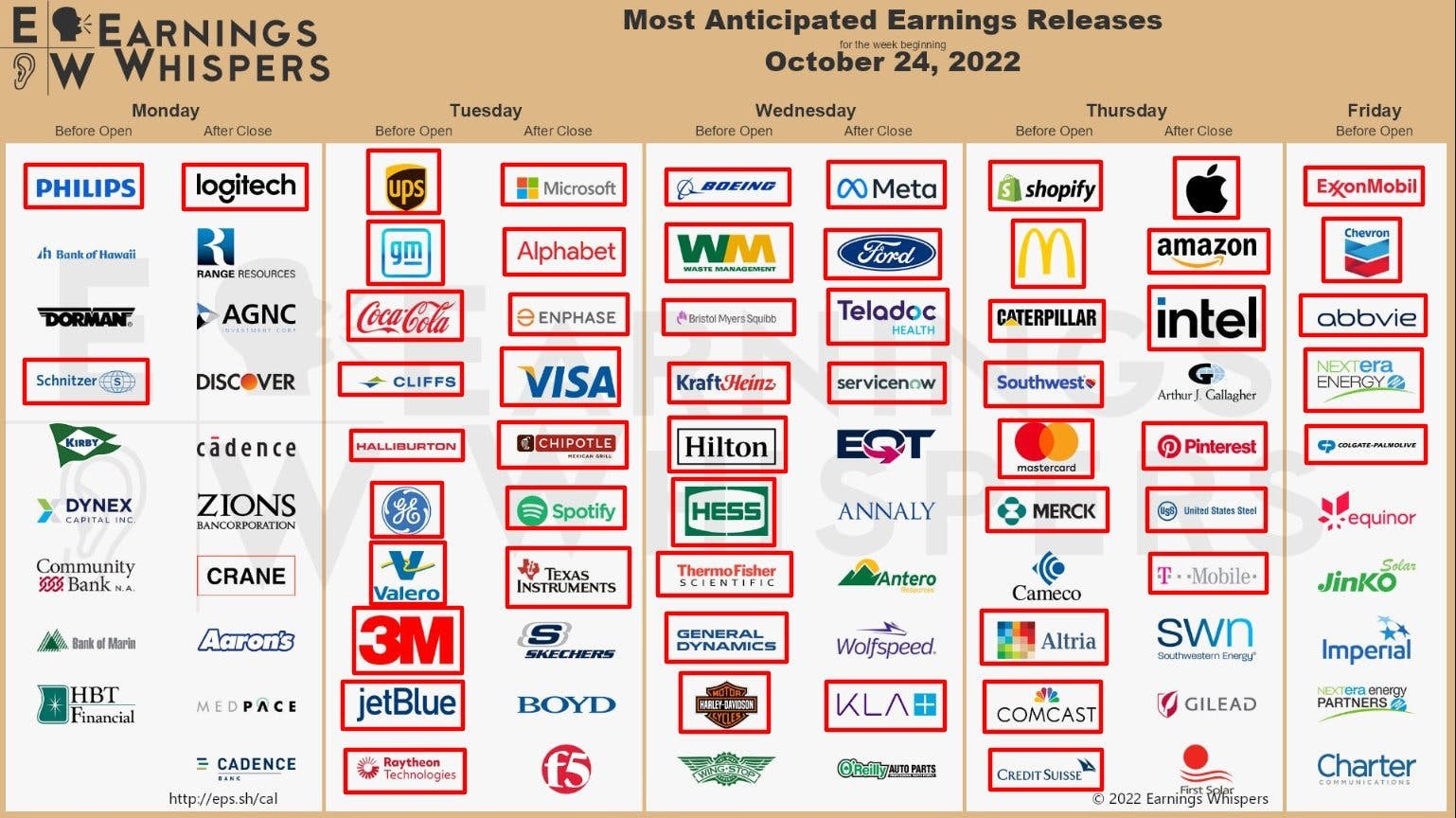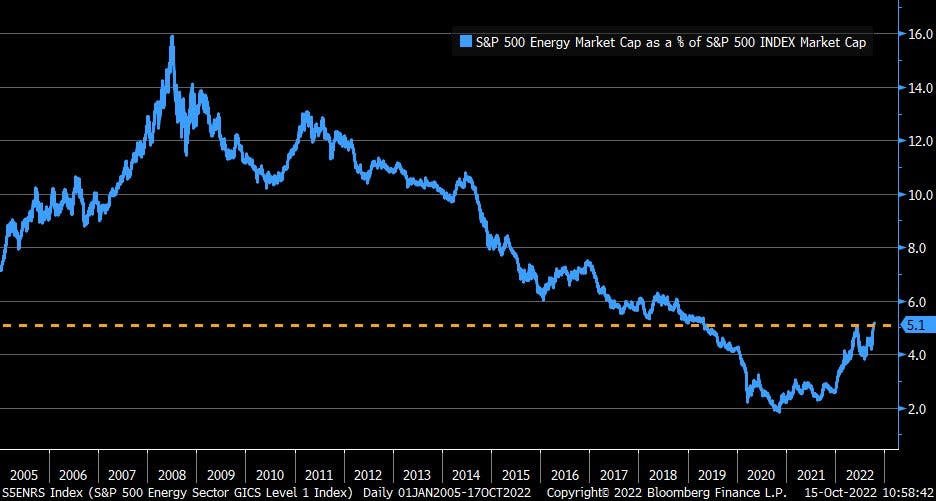Amazon Bouche: FANG Is Dead, Long Live The New FANG!
Before we get to the main course, we wanted to briefly touch on the stock market and the developments therein.
In short, we had a HUGE week of earnings this week, including most importantly, all the tech giants reporting their 3rd quarter numbers.
This wasn't all, however. This past week saw a huge plurality of companies reporting and we have now seen most of the S&P 500's 3rd Quarter numbers:
Here is the day-by-day lineup of the most important companies:
Meaty.
Now, the release of the big tech company numbers has been a big event for years.
And for good reason:
The big tech companies are, well, very big and hugely important and revealing for the state of the American economy and the direction of the market. When you dominate the index in terms of the size, it isn't a shock that your earnings announcements come to dominate the calendar.
You can cut these things in endless ways but, roughly speaking, the big 5 (Apple, Amazon, Microsoft, Facebook and Google) peaked at 22.9% of the S&P 500 in 2021.
But that may now be changing!
This year the largest tech companies have fallen steadily and, as we have pointed out a few times, many of them have dramatically underperformed the wider index(s).
See here:
It would appear that you can, in fact, go very wrong just buying the biggest tech companies.
More importantly still: Big Tech's company performance may no longer matter for the broader market or at least in the way that they once did.
As we tried to suggest this summer, the stock market champions of the last decade have firmly fallen from grace.
As a reminder, we argued then that they might never retake market leadership again. And their market performance may also sharply diverge within this group of companies.
We saw evidence of both those themes this past week.
But there were new developments as well:
We are now entering a world where the FA(A)NG stocks of Apple, Microsoft, Amazon, Google (Alphabet) and Netflix and Facebook (Meta) are selling off (hard) but the broader market can rally despite that fact.
Why?
Because, as we have argued numerous times, we are entering a new economic regime.
And, unsurprisingly, with a new regime, you will have a new group of companies best positioned to capitalize on the underlying economic conditions.
We have beat the interest rate point to death but that doesn't make it unimportant. This week was perhaps the best evidence that high growth companies are out of favor but not just because of interest rates.
Also because their business models themselves are changing and/or becoming challenged.
Here are some of the newest details:
Google collapsed 6+% after they revealed that despite their efforts, costs remained high and
Meta fell well over 25% after their earnings were even more disappointing.
Microsoft actually surpassed market expectations but their lowered guidance and drop in cloud computing revenues meant that the stock still dropped ~6%.
The biggest news was perhaps from the biggest of the big that came out after the market closed on Thursday. Amazon also disappointed and led to the stock cratering 20% before recovering to around 9-10%.
There is also the fact that the all important US ten year bond yield also fell this week.....
And so fundamentals of these companies are also, in many cases, even more problematic.
In a second piece this summer, we also tried to point out that Meta, in particular, could be in real trouble:
Their core platform business is stagnating
While a new competitor (TikTok) is eating their lunch
And they are spending quite literally billions and billions on a bet, virtual reality, with little guaranteed and even less to show for it thus far.
This week only deepened these trends and the net result is Meta is now worth less than Home Depot. HD is still a huge enterprise but, for Meta, a $300 billion market cap is quite a fall for a company that was well over $1 trillion as recently as - checks watch - last year.
A 70% fall for one of America's largest and most profitable companies is quite a fall!
In other words, FA(A)NG is dead.
And so hopefully is the idea that, rather than buy the entire S&P 500 index you can instead just buy a small subset of the "best" companies and do even better.
But these companies' fall from grace - and also the fact that their fortunes are diverging (the dispersion point above) is very welcome.
Why?
Because long live the new FANG which is leading the market higher. The S&P 500 somehow finished the week 3.70% higher.
And a whopping 2.46% of that number came AFTER all of the Big Tech's earnings disappointment was known.
We may be watching the end of the awful "FANG" acronym and Big Tech outperformance but we are also bearing witness to the rise of a New FANG. A group of companies yet to be given a terrible marketing slogan of their own.
Now, the New Fang might be summarized as: the Old Industrial Economy. Or perhaps the old & hated economy. If you look at the earnings calendar above you will likely notice that it isn't just the Big Tech companies. There are plenty of other, far less notable companies, many of which represent boring sectors and industries. Or even disliked ones.
And yet it is those companies' earnings results that saved this week's performance and are leading the market higher in this bounce.
The key way to understand this might be simply that very different sectors will lead the market so the performance under the surface will be significantly different from the past.
A simple way to frame this might be: the "old" (and unsexy) Dow Jones Industrial Average index will do well, the tech heavy NASDAQ index will do poorly.
A few S&P 500 (rapidly changing) weightings to consider to put this in context: Google is 3.6%, Microsoft is 5.7%, Apple is 7.1%, Amazon is 3.4%. Compared to: Chevron at 1%, Exxon at 1.3% and Schlumberger at .23%.
Today, these weightings might never completely invert but simply become far more balanced.
The Big 5 tech companies were nearly 23% of the S&P 500 and, at one point, energy was a lowly 1.8% of the index in 2020 (all time low). Now the latter's percentages are more like 5%.
And if the sector that has a 5% index weight continues to report 25% of the index's profits then it can likely be expected to grow further.
The Dow is now down less than 9% on the year. The S&P 500 ( at -19%~) and Nasdaq 100 (-30%) are both underperforming the most venerable of stock market indexes by a significant chunk in 2022
What is old is new again, seemingly.
*******
Have questions? Care to find out more? Feel free to reach out at contact@pebble.finance or join our Slack community to meet more like-minded individuals and see what we are talking about today. All are welcome.




